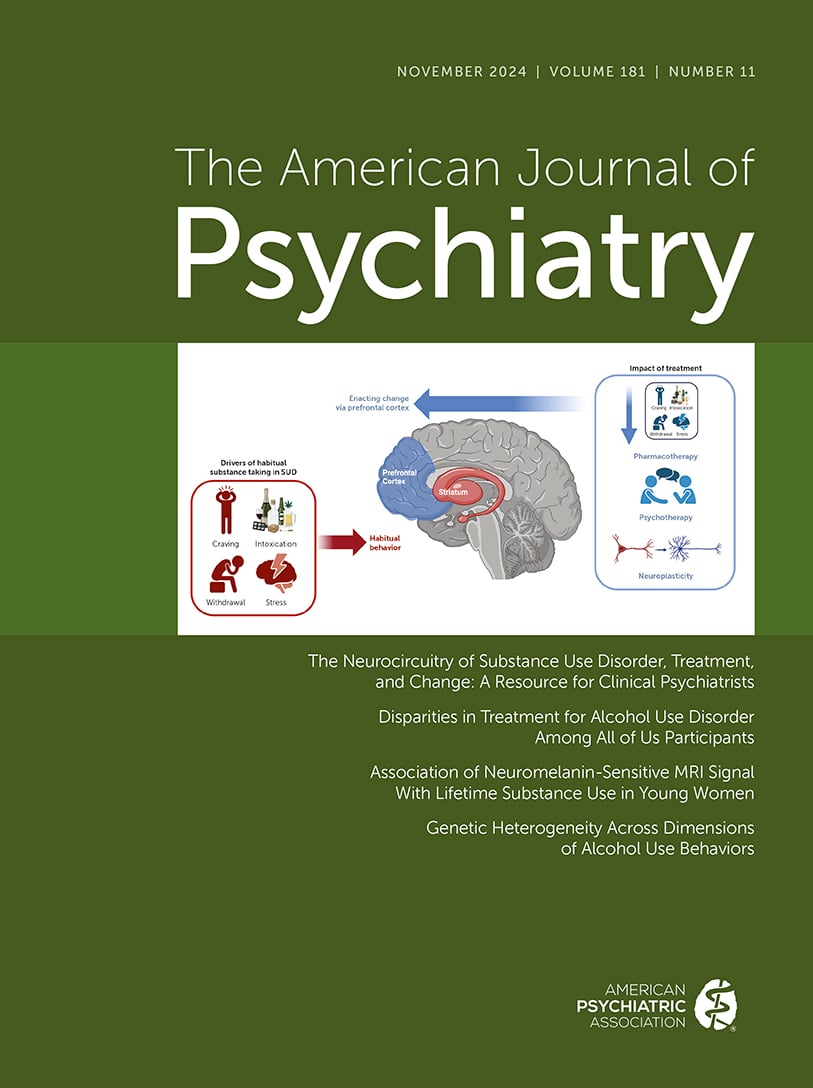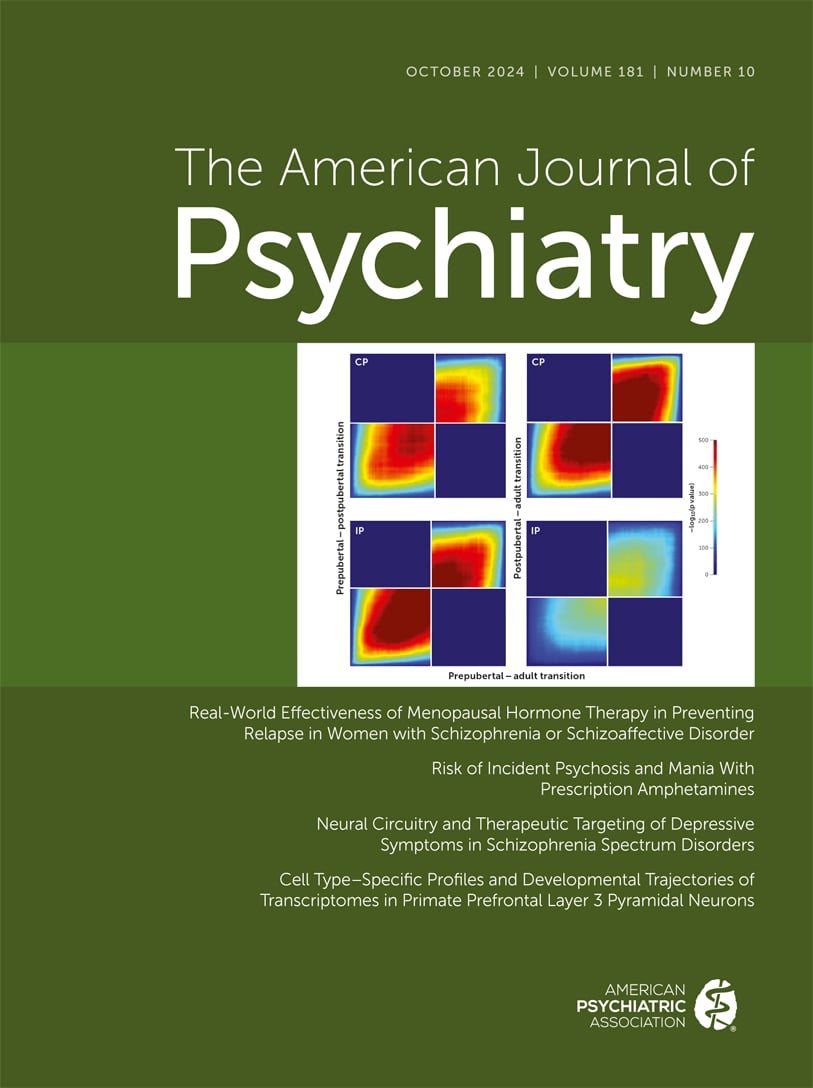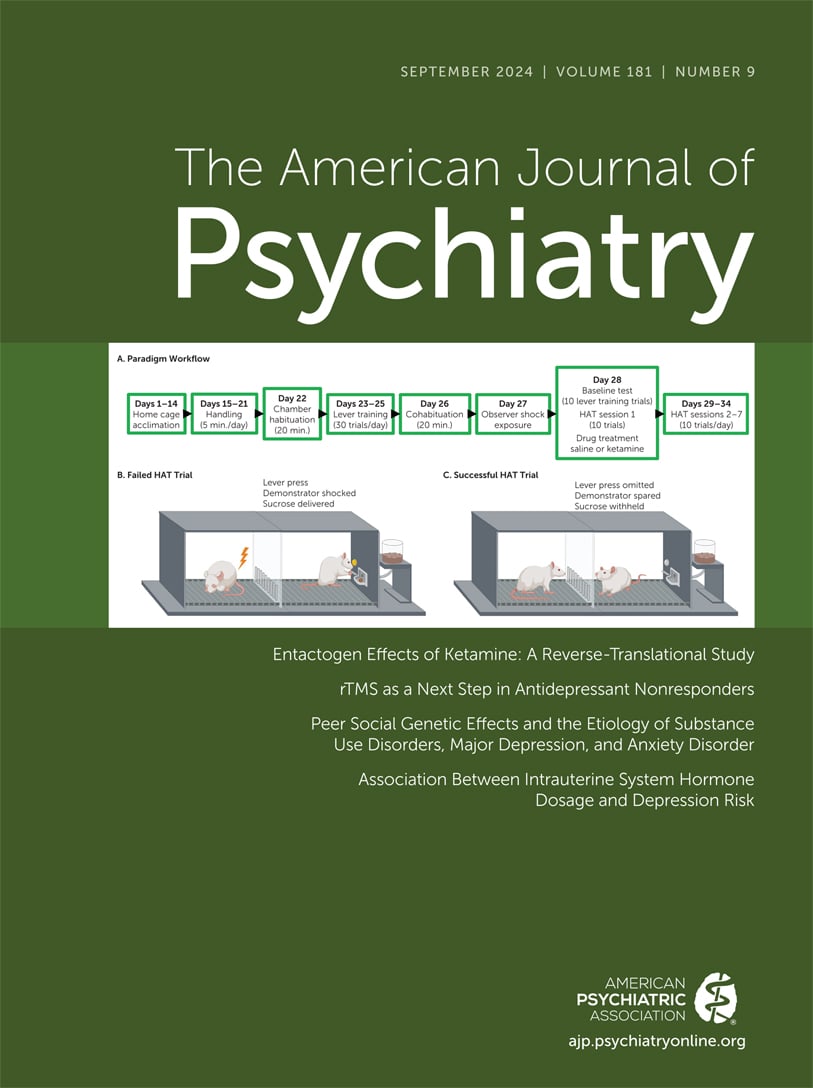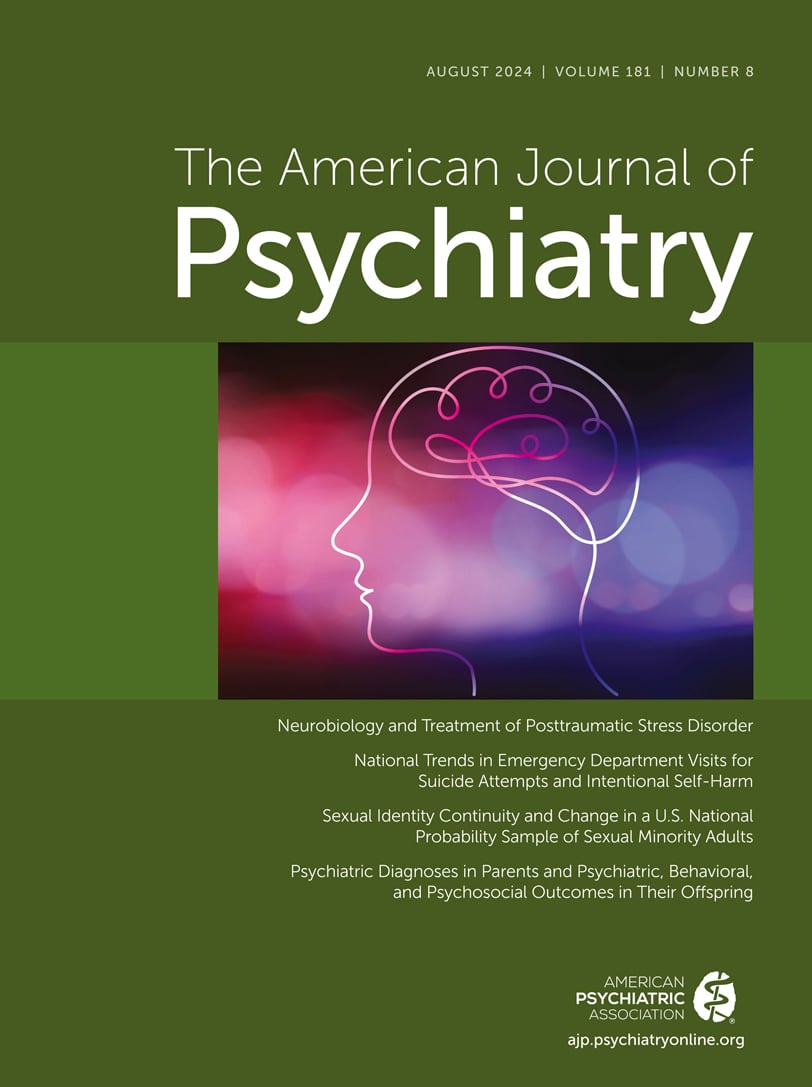American Journal of Psychiatry
- Volume 163
- Number 5
- May 2006
In This Issue
Editorial
Editor's Note
Images in Neuroscience
Reviews and Overviews
Publication date: 01 May 2006
Pages772–778Objective: From an ethical perspective, psychiatrists cannot accept gifts of significant monetary value from their patients. This guideline raises important questions regarding institutional practices related to gift-giving in academic ...
https://doi.org/10.1176/ajp.2006.163.5.772Introspections
Treatment in Psychiatry
Clinical Case Conference
Images in Psychiatry
Article
Publication date: 01 May 2006
Pages790–799Objective: This study assessed the efficacy of olanzapine in delaying or preventing conversion to psychosis and reducing symptoms in people with prodromal symptoms of schizophrenia. Method: This randomized trial occurred at ...
https://doi.org/10.1176/ajp.2006.163.5.790Publication date: 01 May 2006
Pages800–804Objective: The suicide rate in schizophrenia is high, with the risk being highest early in the course. The rate of suicide attempts before treatment onset is also high and is often the event leading up to first treatment contact. A previous ...
https://doi.org/10.1176/ajp.2006.163.5.800Publication date: 01 May 2006
Pages805–812Objective: Light therapy and antidepressants have shown comparable efficacy in separate studies of seasonal affective disorder treatment, but few studies have directly compared the two treatments. This study compared the effectiveness of light ...
https://doi.org/10.1176/ajp.2006.163.5.805Publication date: 01 May 2006
Pages813–821Objective: The authors explored the relationship between the initiation of therapy with selective serotonin reuptake inhibitor (SSRI) antidepressants and completed suicide in older patients. Method: The authors linked ...
https://doi.org/10.1176/ajp.2006.163.5.813Publication date: 01 May 2006
Pages822–826Objective: The primary purpose of this report was to investigate whether characteristics of subjects with borderline personality disorder observed at baseline can predict variations in outcome at the 2-year follow-up. Method: ...
https://doi.org/10.1176/ajp.2006.163.5.822Publication date: 01 May 2006
Pages827–832Objective: The purpose of this study was to determine the most clinically relevant baseline predictors of time to remission for patients with borderline personality disorder. Method: A total of 290 inpatients meeting ...
https://doi.org/10.1176/ajp.2006.163.5.827Publication date: 01 May 2006
Pages833–838Objective: Aripiprazole is a relatively new atypical antipsychotic agent that has been successfully employed in therapy for schizophrenia and schizoaffective disorders. A few neuroleptics have been used in therapy for patients with borderline ...
https://doi.org/10.1176/ajp.2006.163.5.833Publication date: 01 May 2006
Pages839–845Objective: The purpose of this study was to examine the correlates and consequences of two constructs related to affective experience: neuroticism and affective instability. Method: One hundred thirty-two patients were ...
https://doi.org/10.1176/ajp.2006.163.5.839Publication date: 01 May 2006
Pages846–856Objective: Virtually no research has tested alternatives to the diagnostic method used since DSM-III, which requires decisions about the presence/absence of individual diagnostic criteria, followed by counting symptoms and applying cutoffs (the ...
https://doi.org/10.1176/ajp.2006.163.5.846Publication date: 01 May 2006
Pages857–864Objective: The anxiety and depressive disorders exhibit high levels of lifetime comorbidity with one another. The authors examined how genetic and environmental factors shared by the personality trait neuroticism and seven internalizing ...
https://doi.org/10.1176/ajp.2006.163.5.857Publication date: 01 May 2006
Pages865–871Objective: The purpose of this study was to examine the long-term stability of depressive personality disorder. Method: The subjects included 142 outpatients with axis I depressive disorders at study entry; 73 had depressive ...
https://doi.org/10.1176/ajp.2006.163.5.865Publication date: 01 May 2006
Pages872–880Objective: The purpose of this study was to describe the 10-year course and outcome of dysthymic disorder. Method: The authors conducted a naturalistic, prospective, longitudinal follow-up of 97 adults with early-onset ...
https://doi.org/10.1176/ajp.2006.163.5.872Publication date: 01 May 2006
Pages881–884Objective: The purpose of this study was to examine symptoms of posttraumatic stress disorder (PTSD) in a community sample of low-income pregnant women who met the DSM–IV diagnostic criteria for the disorder. Method: ...
https://doi.org/10.1176/ajp.2006.163.5.881Publication date: 01 May 2006
Pages885–892Objective: The association between violence between intimate partners and psychiatric disorders is assumed to reflect a causal link. This assumption is now questioned because several longitudinal studies have documented that adolescents with ...
https://doi.org/10.1176/ajp.2006.163.5.885Publication date: 01 May 2006
Pages893–898Objective: The authors assessed the efficacy of sertraline in the treatment of night eating syndrome. Method: Thirty-four outpatients diagnosed with night eating syndrome were randomly assigned to receive either sertraline (...
https://doi.org/10.1176/ajp.2006.163.5.893Publication date: 01 May 2006
Pages899–906Objective: Maternal eating disorders interfere with parenting, adversely affecting mother-infant interaction and infant outcome. This trial tested whether video-feedback treatment specifically targeting mother-child interaction would be ...
https://doi.org/10.1176/ajp.2006.163.5.899Publication date: 01 May 2006
Pages907–912Objective: This study investigated the course of body dysmorphic disorder (BDD), a relatively common and severe disorder, in the first prospective follow-up study, to the authors’ knowledge. Method: In this study, the ...
https://doi.org/10.1176/ajp.2006.163.5.907Publication date: 01 May 2006
Pages913–918Objective: Despite attempts in psychiatry to adopt an integrative biopsychosocial model, social scientists have observed that psychiatrists continue to operate according to a mind-brain dichotomy in ways that are often covert and unacknowledged ...
https://doi.org/10.1176/ajp.2006.163.5.913Publication date: 01 May 2006
Pages919–926Objective: With the explosion of research in psychiatric neuroscience, the extent and means by which neuroscientific progress will translate into clinical care remains largely uncertain. The authors sought to determine how this dilemma is ...
https://doi.org/10.1176/ajp.2006.163.5.919Brief Report
Publication date: 01 May 2006
Pages927–929Objective: In this birth cohort study, the authors examined the relation between prenatal exposure to maternal genital/reproductive (G/R) infections and schizophrenia in offspring. Method: The birth cohort consisted of 7,794 ...
https://doi.org/10.1176/ajp.2006.163.5.927Publication date: 01 May 2006
Pages929–931Objective: Autism has a strong, complex genetic component, most likely involving several genes. Multiple genomic screens have shown evidence suggesting linkage to chromosome 2q31–q33, which includes the SLC25A12 gene. ...
https://doi.org/10.1176/ajp.2006.163.5.929Publication date: 01 May 2006
Pages932–933Objective: One-third of patients with a schizophrenia spectrum disorder have a measurable olfactory identification deficit at first examination. The authors studied the relationship of this deficit to symptom remission after 1 year of ...
https://doi.org/10.1176/ajp.2006.163.5.932Publication date: 01 May 2006
Pages934–936Objective: The cause of autistic spectrum disorder (i.e., autism and Asperger’s syndrome) is unknown. The serotonergic (5-HT) system may be especially implicated. However, cortical 5-HT 2A receptor density in adults with the ...
https://doi.org/10.1176/ajp.2006.163.5.934Letters to the Editor
Correction
Book Forum
Books Received
Past Issues
View Issues Archive
Vol. 181 | No. 11

Vol. 181 | No. 10

Vol. 181 | No. 9
